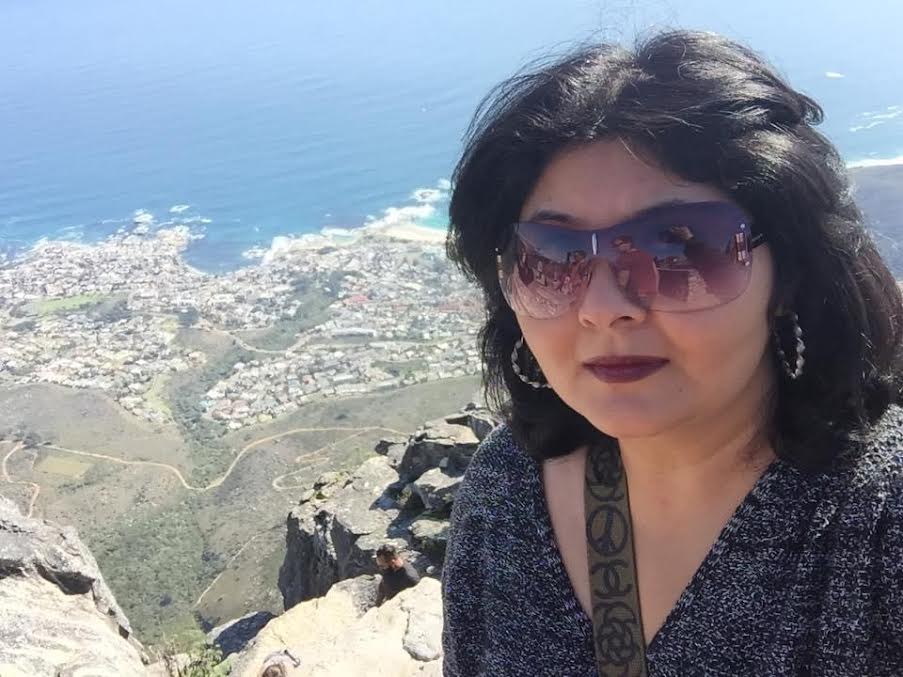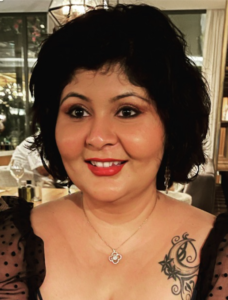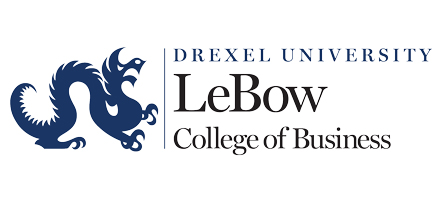
Ketaki Banga in South Africa
Ketaki Banga took a risk.
Despite family pressure to become a doctor, lawyer, or engineer, Banga followed her instincts. She became what she’d always wanted to be: a storyteller.
The risk: For the right job, in the right moment, she had to quit university in the final year of her undergraduate degree.
With only a two-year diploma in advertising and journalism under her belt, Banga moved from her hometown in Delhi to Mumbai — a transition “not for the faint of heart,” she says — to start her writing career. Equally passionate about technology and business as she is about storytelling, for her, Mumbai would only be the start.
‘DREAMS DON’T HAVE AN EXPIRY DATE’

Ketaki Banga
Working as a technology reporter, Ketaki Banga quickly found her footing in Mumbai, but she didn’t have long to wait for the next opportunity — a new job in East Africa, where she lived and worked for four years.
Now a single mother of two living in Dubai, UAE, Banga’s career as a storyteller has spanned diverse roles. Starting out as a writer, she quickly progressed to editor, account director, and finally executive vice president of Dubai-based marketing firm BPG, where she’s one of three women on the leadership team. There, she manages a female-led team who she describes as “unapologetically strong, opinionated, and diverse.”
This career progression did not happen in a conventional way, though — Banga’s journey’s been fraught with adversity. A separation from her partner and navigating the business world as a single working mother hasn’t been easy. Luckily, she’s never let her challenges get in the way. “It’s so easy to become bitter when things happen and think, ‘why me?’ or ‘I deserve better.’ But it’s important to look at everything as an opportunity,” Banga tells Poets&Quants. “Just as storytelling has always been part of my life, so has transformation. I saw these struggles as moments where I could transform my life and make it a life that I really wanted to live.”
Now, she’s determined to create equal opportunity for people like her to thrive. This month she joined London Business School’s Dubai campus to begin her executive MBA degree.
With hopes of deepening her business knowledge, her goal is to humanize business and create more opportunities for women to succeed. “My hope is that by the time I retire, it’s not so much about breaking ceilings as it is about not having any ceilings at all. Not just for women, but for everyone who feels that they are different,” she says. “This EMBA is a little later in life than planned, but dreams don’t have an expiry date.”
Here, she shares the twists and turns of her career journey and what she’s learned from her continuous transformation.
THE POWER OF WORDS
Banga has always been passionate about the power of words. Beginning her storytelling career as a writer was the first step. “I loved how my work in advertising and journalism gave me the ability to express myself. I always felt that I had a lot to feel. I had a lot to experience and express. Writing, speaking and communicating was a way to give space to everything that was inside of me,” she says.
A natural born leader, Ketaki strived to be a mentor as well as a communicator. “Words are powerful; they can heal, hurt, inspire, and create new realities. They can get us through so much and help other people be strong,” she explains.
With the belief that storytellers are only as good as their experience, she strengthened her skills through her work in East Africa; there, she communicated with people from all over the continent, including Tanzania, Kenya, Uganda, and South Africa. This taught her vital skills in learning how to connect with people of all backgrounds and cultures. “A good writer is someone who understands what makes people laugh and what makes them cry,” she says. “Sharing real experiences, cultures, and stories was how I connected with people in meaningful ways.”
Banga recounts reaching a ceiling as a journalist in East Africa. A lifelong learner and seeker of growth, she moved to Dubai with her partner and young child to start the next chapter of her career in 2007. “I reached a point in my life where I wondered, ‘what’s next?’” she says. “I had to take a leap of faith and evolve my skills.”
HER NEXT STEP: GROUP EDITOR
Parting with East Africa was no small feat; Banga says that when she left the continent, she left a part of her soul behind. Nevertheless, as a working mother she appreciated the opportunities, infrastructure, and ability to live closer to home that Dubai offered. “People have a certain stereotype about the Middle East, but as a working woman and mother, I feel far more supported here than I probably would have felt anywhere else in the world,” says Banga. “In Dubai, you’re exposed to opportunities, people, and new perspectives. It’s so cosmopolitan with tons of different nationalities. There’s an expectation of mutual respect and tolerance. I love it here, which is why it’s been home for the last 14 years.”
Soon after her move to Dubai, Banga joined a publishing house as a group editor. “This was scary, because I was about to jump into a totally new role. But I’ve done this a few times in my career, and this is always how I’ve grown,” she says.
As group editor, she helped to make the business more human, relatable, and relevant. “That resonated well with startups and entrepreneurs. Typically, business magazines were targeting larger businesses. Very few of them had the personality, quirkiness, and character that a lot of startups had. By making our publications more human, we were able to resonate with startups and entrepreneurs in the small and medium enterprises that we targeted,” she explains.
Along with making the business more human, she also worked to broaden the publishing house’s portfolio, adding more business publications to their repertoire and even expanding into Qatar.
She says the most interesting part of her role was in creating new revenue streams; back then, revenue came from advertising. However, Banga helped to bring in revenue through community-building, providing opportunities for workshops, mentorship, conferences, and awards. “That was very disruptive for the publishing sector back then, which was around 2010,” she says.




